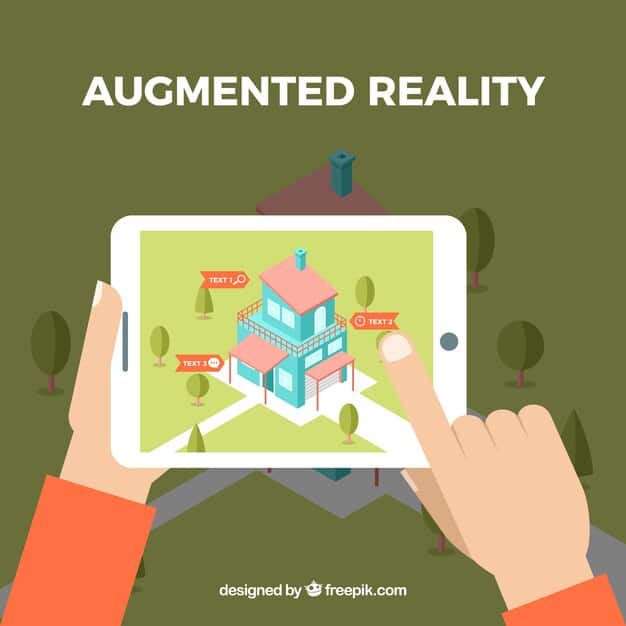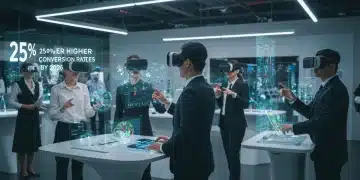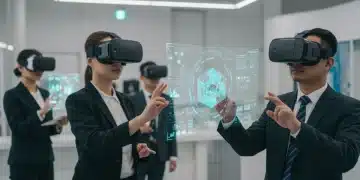VR for Real Estate: Boost Sales with Virtual Property Tours in 2025

VR for Real Estate in 2025 is revolutionizing property sales by enabling immersive virtual tours, which enhance customer experience, reduce time-to-close, and offer data-driven insights for optimized marketing strategies, enabling real estate professionals to close deals 15% faster.
Step into the future of real estate with VR for Real Estate: Close Deals 15% Faster with Virtual Property Tours in 2025. Discover how virtual reality is transforming property viewings, offering immersive experiences that not only captivate potential buyers but also accelerate the deal-closing process by an impressive 15%.
Why VR is the Next Big Thing for Real Estate
Virtual Reality (VR) is no longer a futuristic concept; it’s a present-day tool reshaping industries, and real estate is no exception. As we move into 2025, VR is poised to become a staple, particularly in how properties are marketed and sold. The technology offers a myriad of benefits, from enhanced customer engagement to significant cost savings.
The immersive nature of VR sets it apart from traditional property viewings. Instead of relying on photographs and written descriptions, potential buyers can virtually step inside a property, explore every corner, and get a true sense of the space.

Enhanced Customer Engagement
One of the primary advantages of VR is its ability to deeply engage potential buyers. Standard property listings often fall short in conveying the true essence of a home. VR tours, however, provide a realistic and interactive experience, making it easier for buyers to connect emotionally with a property.
- Immersive Experience: VR tours offer a 360-degree view, allowing buyers to explore every aspect of the property from the comfort of their home.
- Emotional Connection: By providing a realistic sense of space, VR helps buyers visualize themselves in the property, fostering an emotional connection.
- Interactive Exploration: Buyers can interact with the environment, such as opening doors and checking views from different windows, enhancing their engagement.
More than just seeing, VR encourages interaction. Potential buyers can virtually open doors, examine details, and experience the property as if they were physically there. This level of engagement is invaluable, transforming passive browsing into an active, immersive exploration.
How VR Tours Are Speeding Up the Deal-Closing Process
The benefits of VR in real estate extend beyond just improving the viewing experience. They directly translate into a more efficient and faster deal-closing process. By streamlining various stages of property sales, VR is proving to be a game-changer for real estate professionals.
The traditional method of property viewing often involves scheduling multiple appointments, traveling to different locations, and spending considerable time on each visit. VR tours significantly reduce these logistical challenges, allowing buyers to view multiple properties in a single session, saving time and resources.
Reducing Time on the Market
Properties listed with VR tours tend to spend less time on the market. The enhanced visibility and engagement provided by VR attract more qualified leads, leading to quicker sales. This is particularly beneficial for sellers looking to close deals swiftly.
Streamlining the Viewing Process
VR tours streamline the viewing process by enabling potential buyers to pre-qualify properties. This means buyers can virtually tour multiple properties and narrow down their choices to those that genuinely meet their needs and preferences. This targeted approach saves time for both buyers and agents, focusing efforts on the most promising leads.

VR enables potential buyers to pre-qualify properties from anywhere in the world. International investors, for instance, can explore properties without incurring travel costs or dealing with logistical hurdles. This broader audience translates to quicker sales and better deals for sellers.
The Cost-Effectiveness of VR in Real Estate
While the initial investment in VR technology might seem daunting, the long-term cost-effectiveness is undeniable. Compared to traditional marketing methods and the expenses associated with physical showings, VR offers a financially sound alternative.
Traditional property marketing often involves costly photography, staging, and printed materials. VR tours eliminate or significantly reduce these expenses. Once a VR tour is created, it can be used repeatedly, reaching a broader audience without incurring additional costs. This scalability makes VR a cost-effective solution for real estate marketing.
Reduced Travel Costs
Physical property viewings entail travel costs for both agents and buyers. VR tours eliminate the need for physical travel, saving on transportation expenses, fuel, and time. This is especially beneficial for buyers looking at properties in different cities or countries.
- Lower Marketing Expenses: VR tours reduce the need for expensive traditional marketing materials.
- Reduced Travel Costs: Virtual viewings cut down on travel expenses for both agents and clients.
- Increased Efficiency: VR enables agents to manage more viewings in less time, boosting productivity.
In summary, the cost-effectiveness of VR in real estate is clear. From reducing marketing expenses to cutting down on travel costs and boosting agent efficiency, VR offers significant financial benefits that contribute to a healthier bottom line.
VR for Real Estate: Data Insights for Smarter Sales
Beyond the immersive experience and cost savings, VR offers invaluable data insights that can significantly improve sales strategies. The technology allows real estate professionals to track how potential buyers interact with a property, providing a wealth of information to optimize marketing efforts.
VR tours can track which areas of a property receive the most attention, how long buyers spend in each room, and what features they interact with. This data provides a clear picture of what aspects of a property are most appealing to potential buyers, enabling agents to highlight these features in their marketing campaigns.
Understanding Buyer Behavior
By analyzing how buyers navigate through a VR tour, agents can gain insights into their preferences and priorities. For instance, if a buyer spends more time in the kitchen and master bedroom, it suggests these are key areas of interest. This understanding allows agents to tailor their sales pitch and focus on the most relevant features.
Optimizing Staging and Marketing
Data gathered from VR tours can also inform staging and marketing decisions. If certain rooms or features are consistently overlooked, it might indicate the need for improvements or adjustments in staging. This data-driven approach ensures that marketing efforts are targeted and effective.
The data insights derived from VR tours empower real estate professionals to make informed decisions that optimize their sales strategies. By understanding buyer behavior, personalizing the sales pitch, and optimizing staging and marketing, agents can significantly improve their chances of closing deals quickly and efficiently.
Future Trends: What’s Next for VR in Real Estate?
As VR technology continues to evolve, its integration into the real estate industry will only deepen. Several emerging trends are set to further enhance the role of VR in property sales, making it an indispensable tool for real estate professionals.
One exciting trend is the integration of Artificial Intelligence (AI) into VR tours. AI-powered virtual assistants can guide buyers through a property, answer questions, and provide additional information about the neighborhood and amenities. This personalized interaction enhances the viewing experience and provides valuable support to potential buyers.
Another trend is the development of more sophisticated VR platforms that allow for collaborative viewing experiences. Multiple buyers can virtually tour a property together, even if they are in different locations. This collaborative aspect can be particularly valuable for families and investment groups making joint decisions.
- AI Integration: AI-powered virtual assistants will enhance the interactive experience in VR tours.
- Collaborative Viewing: Multiple buyers can simultaneously tour a property from different locations.
- Augmented Reality (AR) Overlays: AR will enable buyers to visualize furniture and modifications within a virtual property.
Augmented Reality (AR) is also set to play a role in the future of VR in real estate. AR overlays will allow buyers to visualize how furniture would look in a property or see potential modifications and renovations. This combination of VR and AR will provide an even more immersive and personalized viewing experience.
Getting Started with VR in Your Real Estate Business
The transition to incorporating VR into your real estate business doesn’t have to be overwhelming with VR for Real Estate: Close Deals 15% Faster with Virtual Property Tours in 2025. There are several straightforward steps you can take to begin leveraging this transformative technology and reap its benefits. Start by researching available VR platforms and solutions that cater to the real estate industry.
Begin by partnering with a VR provider or investing in the necessary equipment to create virtual tours. This might involve hiring professional photographers or videographers who specialize in capturing 360-degree views of properties. Ensure that the VR tours are high-quality and visually appealing to make a lasting impression on potential buyers.
Training Your Team
Equip your real estate team with the skills and knowledge needed to effectively use VR in their sales process. Conduct training sessions to familiarize agents VR for Real Estate: Close Deals 15% Faster with Virtual Property Tours in 2025 with the technology, demonstrate its benefits, and teach them how to present VR tours to clients.
Promoting Your VR Tours
Highlight the availability of VR tours in your property listings and marketing materials. Showcase the immersive experience and convenience that VR offers to potential buyers. Use social media, email campaigns, and your website to promote your VR tours and attract a wider audience.
Incorporating VR into your real estate strategy is a significant step towards modernizing your business and enhancing the customer experience. By building the necessary skills, promoting your VR tours and choosing the right platforms your are well on your way with VR for Real Estate: Close Deals 15% Faster with Virtual Property Tours in 2025. The advantages are enhanced customer experience, reduce time-to-close, offer data-driven insights ,and optimized marketing strategies.
| Key Point | Brief Description |
|---|---|
| 🏠 Immersive VR Tours | Offers 360-degree virtual property exploration. |
| ⏱️ Faster Deal Closing | VR tours streamline viewings, speeding up sales by 15%. |
| 💰 Cost-Effective | Reduces expenses on marketing and travel. |
| 📈 Data-Driven Insights | Tracks buyer behavior to optimize marketing strategies. |
Frequently Asked Questions
▼
VR tours offer an immersive 360-degree view, allowing buyers to explore properties remotely. This creates a stronger emotional connection and greatly enhances the overall customer experience compared to traditional methods.
▼
Yes, properties listed with VR tours tend to sell faster. The enhanced visibility and engagement attract more qualified leads, streamlining the sales process and reducing the time properties remain on the market.
▼
While initial investment is needed, VR reduces marketing expenses, lowers travel costs, and increases agent efficiency. These savings make VR a financially sound alternative to traditional property marketing.
▼
VR tours track buyer interactions, like the areas they focus on and the time spent in each room. This data helps agents understand buyer preferences, allowing them to personalize sales pitches and optimize staging.
▼
Future trends include AI-powered virtual assistants, collaborative viewing experiences, and augmented reality overlays. These advancements will further enhance immersion and personalization for potential property buyers.
Conclusion
As 2025 approaches, VR for Real Estate: Close Deals 15% Faster with Virtual Property Tours in 2025 is not only a technological advancement but a fundamental shift in how properties are viewed, marketed, and sold. Embracing VR allows real estate professionals to enhance customer engagement, accelerate deal closures, reduce costs, and gain valuable data insights, paving the way for a more efficient and successful future.





